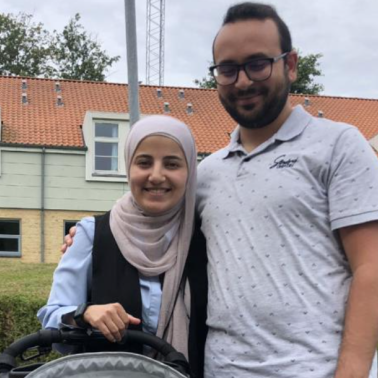
Palestinian Osama Alrantisi, with a young family present, started of the Family theme by telling how he is exploring how love could conquer anger. For him the challenge is to spend more time with the family.
The program of Nordic countries meetings completed the fourth leg as the Danish IofC team, in an excellent way pulled off the August 2 – 6 meeting in southern Denmark, with some assistance from the neighbours. 90 people, ranging from 0 to 97 in age, were gathered at the Business College Syd, Mommark. The three full days
had the themes Family, Nation, and Community. The format from earlier years was put to good use, plenary meetings, family groups, workshops, games, free time and Taize evening prayers for those who wanted. The stage was decorated with a graphic expression of a bridge to be mended, the general IofC theme.

Palestinian Osama Alrantisi, with a young family present, started of the Family theme by telling how he is exploring how love could conquer anger. For him the challenge is to spend more time with the family.
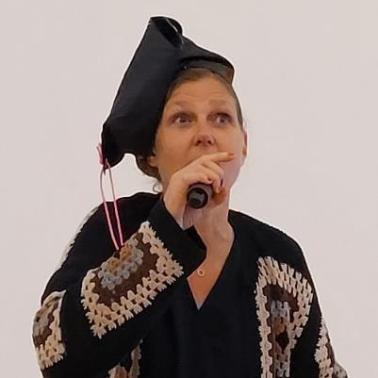
Astrid Eskeland from Norway is 4th generation in IofC. She told of her doubts about being a good enough mother as she is raising her three children alone. She had realized she could not expect circumstances or people in her life to change, but she could change herself. If she wanted her kids to spend less time on their phones, then SHE had to spend less time on her phone.
A Russian delegate, told of her complex ancestry and her conviction for the environment. “You cannot care for the planet before you begin to care for your friends”. “You need to identify with and apologise for what your country is doing, even though you may not be part of it and are opposing it”.
In the evening Siegfried Matlok, a Danish-German journalist, gave a talk on recent history of Slesvig, the region where we were. The area has changed hands between Germany and Denmark several times. The present border runs just north of Flensburg, and there is a German minority north of the border, and a Danish one to the south. Over the years the two countries have learned to treat the minorities in a way that keeps the peace, a process Matlok explained has taken 150 years. The audience posed questions about how a similar peace could be got in Donbass, South Tyrol, and the Baltic countries and preferably in a faster way. Treating minorities well is the way in Matlok’s experience.
Urte Hvidt was born in Germany 1938. Her father was an army doctor. After the war the family settled in Flensburg where they set up a clinic and got a big house where round table talks were held. It became a pattern for how different cultures could live together.
Terttu Laaksonen, is a minister in the southwest of Finland. She gave two examples of how events from the past can live on in the nations subconscious memory. When she was 15 something happened in Asia that made her think a third World War was imminent. Finland would be occupied by the Soviet Union. If that happened, then her plan was to go to Sweden and fight the intruders from there. Another story was from the Great Wrath, 1714-1721. The Cossack army of Peter the Great had occupied the coastal areas of Finland, which was then part of Sweden. They lived off the land and people were starving.
In some villages most people were killed. Many children were taken away from their families to Russia. The grandfather of the author Topelius was one of them, but he managed to escape at the age of 15 and find his way back to Sweden. Danila Raskov was born in Leningrad, Soviet Union, none of which exist with such names today. He describes himself as Russian and Ukrainian with a mother from Nizhny Novgorod and a father from Odessa. He tells how his father was upset when at the age of 16 he put his nationality as Russian, rather than Ukrainian, in the Soviet passport. “Then we were one family and one country but now divided by borders”. Today he lives with his wife and two daughters in Helsinki. “I feel responsible for the nightmare that is happening right now in Ukraine and inside my country.
I think the only way we could escape is telling the truth and recognise mistakes and crimes done by us now and in the past”. “As for me, I believe more in other type of multiple citizenships not connected to states. We, in the academic or the Christian world, are friends with people from many different countries and we are together. An imaginary community, as an academic nation, gives us some hope for the future”.
Karoline Olsen-Jensen is a Greenlandic who grew up in Denmark and Greenland and was trained as a teacher. “In my heart I had a country, I am Greenlandic. In some ways we are two nations together. It is a long history. We were colonised by Denmark. People sometimes say, you are lucky that it was Denmark who colonised Greenland. But who says I am lucky; we lost our culture, and we nearly also lost our language. When I was 7, I had lived in Denmark for 3 years with my parents and I could not speak Greenlandic. Later it turned out good for me that I could speak the language. I am often asked; you do not look like a Greenlander so how do you speak so good Danish? In my heart I have always loved Greenland. And I love my people and I will fight for them. It irritates me when Danes say they come from a little country when they have the biggest island in the world”. On the Friday there was a picnic outing by bus to nearby Sønderborg Castle and a walk around the Sønderborg town in several guided groups
Guleed Mohammed came to Sweden from Somalia in 1995. The immigrations authority decided to place the family in Malung, where only Swedes live. “Nobody even had black hair! Everybody was dressed up when we came. Later we understood that it was not for welcoming refugees, but there was a festival of dance bands that week. We learned a lot about how the Swedish society functions. 2 years later we moved to Tensta where you find 98 nationalities. I got new friends; I celebrated Christmas and Id.
One thing I appreciate in the IofC community is to see white people who are believers. This is important for us coming from other countries to see and understand that this was a Christian country”.
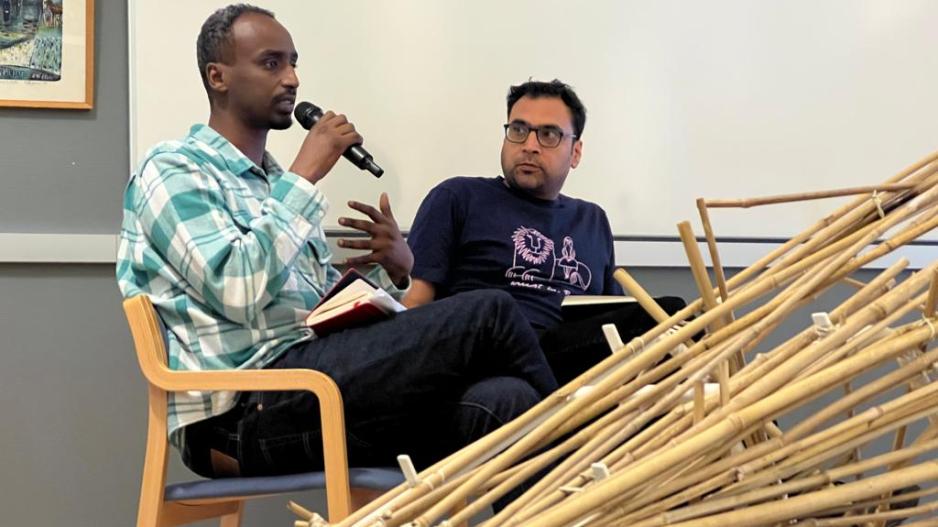
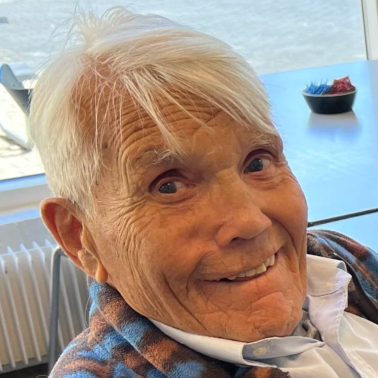
“I would talk of my local community being Europe”. Jens then told how he joined the Norwegian resistance during the second world war. One of his tasks was to look after 2000 Russian prisoners of war, taken by the Germans when Russians helped to liberate northern Norway from German occupation. “I just want to say here and now a big thank you to Russia for the help that they gave us at that time”.
The war ended and the future lay open. However, three months later the world changed. The atom bombs were dropped on Hiroshima and Nagasaki. “The cold war brought the threat of a new war, and the atom bomb would make it worse. I went into a depression. My uncles sent me to Caux where I found new hope”. “Depression in young people is spreading today. I myself was left depressed after seeing the film Oppenheimer about the father of the American atom bomb. With the world in the current state, we simply must learn the art of turning enemies into friends”.
Rishabh Khanna was born in Delhi, India and came to live in Sweden. “I was not aware of the prejudices and biases that I grew up with in India. When I moved to Stockholm in 2013 Hassan was one of my mentors.
My parents were questioning what I was doing in Stockholm. “I learned that this beautiful and sustainable country suddenly is burning. In the place where Hassan and Guleed are living there were riots in 2013. Cars were burning, people were fighting. This has continued for 10 years, also in other cities in Sweden. We wondered then what we could do and started reading up on what happened in the US, the Hope in the Cities program and we created a community program called Hope in Järva. The whole idea with this project was to create spaces for honest conversation between different ethnicities, between generations and between government and citizens and we learned a lot of why people get into conflict and that people can change”.
Liz Bramsen gave the following personal comment about the gathering: There were three things that made an especially deep impression on me in the Nordic meeting: 1. The depth of sharing that we could achieve in no time at all in the smaller "family groups". Tears were shed, moral support was given. Everyone felt they could speak and just be seen as who they were, with their struggles, without judgement. It is amazing to experience how close you can come to feel to people you have never met before in such a short time. Although we came from widely different backgrounds, we quickly found that we shared many of the same joys and sorrows as human beings. No one would want to point a weapon at another nation or people when their grandchildren have roots there. Thus, prejudices can be melted away - it may not be easy, but common grandchildren are a big help! 2. Various international/interracial/intercultural couples who were there, some of them with their beautiful children, had met each other through and because of IofC. Beautiful marriages across borders and continents have been established - and this has often been not only to the benefit of the couple, but to the benefit of the entire extended family. 3. The use of silence. This has always impressed me at every IofC meeting or event that I have attended.
I hope the general rule is never broken that after a lecture, a speech or a testimonial is given, we are asked to keep silence for a few moments instead of jumping into discussion, questions and the like. This practice is so important, because i personally find (and I think many others feel the same way) that it gives me the opportunity not just to respond impulsively or mindlessly, but to let things settle and to respond on a much deeper level”. Thus, again, thank you IofC! So many organizations could learn so much by following your ways. 16 children were part of the gathering. These stones were painted by the children and offered to participants to bring home. There was a dedicated program for the children which also connected to the theme of the day. This allowed the parents to take part in the plenary sessions and other activities. The children quickly got over the language barriers and made friends. Here children are rehearsing a song for the cultural evening. Different workshops were offered, storytelling, dialogue, and a theatre workshop. Frisbee golf was a new experience for me and several others. A workshop on Russian history was given via zoom by Sergei Podbolotov who had wanted to attend but was prevented due to late residence permit renewal in Finland where he currently lives. Several people made use of the possibility of a morning swim in the sea.
The jigsaw got completed in the end by joint efforts of young and old.
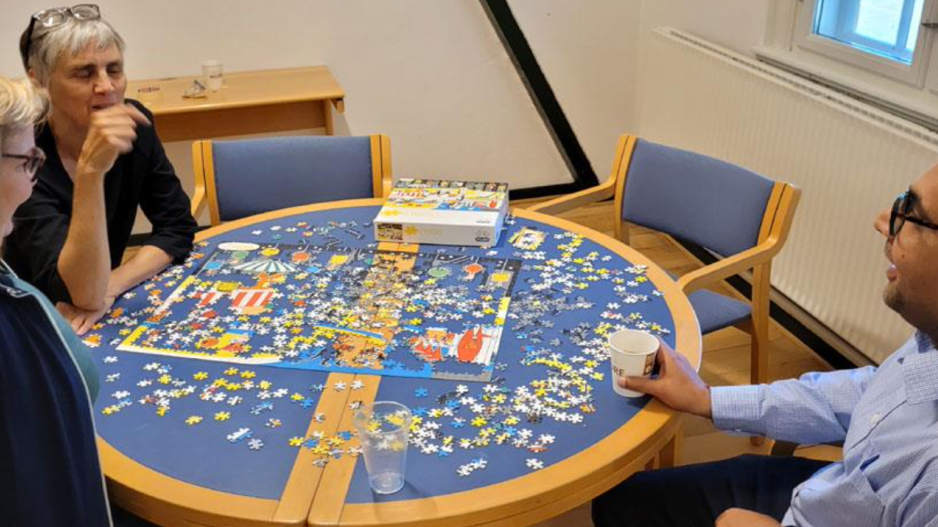
There was a mention of a 15 min film, Bridgebuilders from the early days of MRA/IofC in Denmark. It is available from this link: https://www.foranewworld.org/material/films/bridgebuilders
Final comment by Camilla Nelson: “It is not a matter of making the right choices, but to discover how you are chosen”.
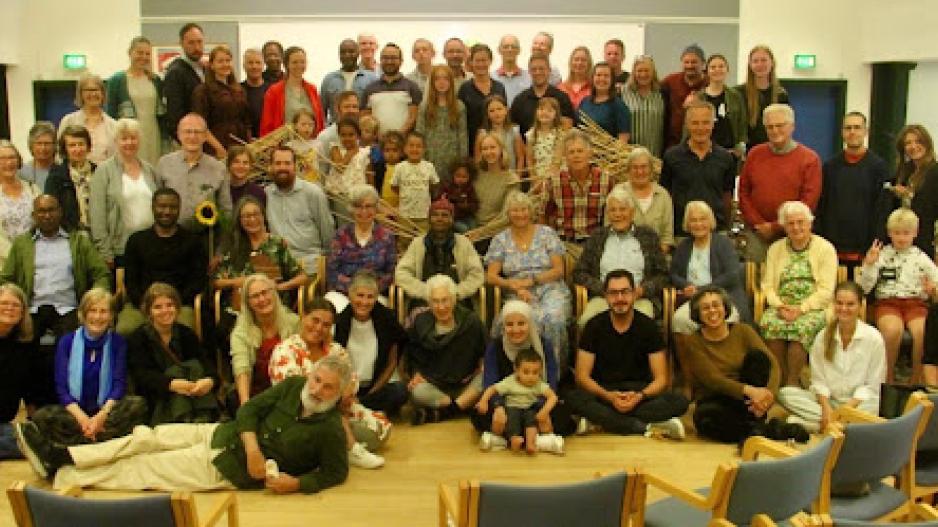
Report by Antero Tikkanen